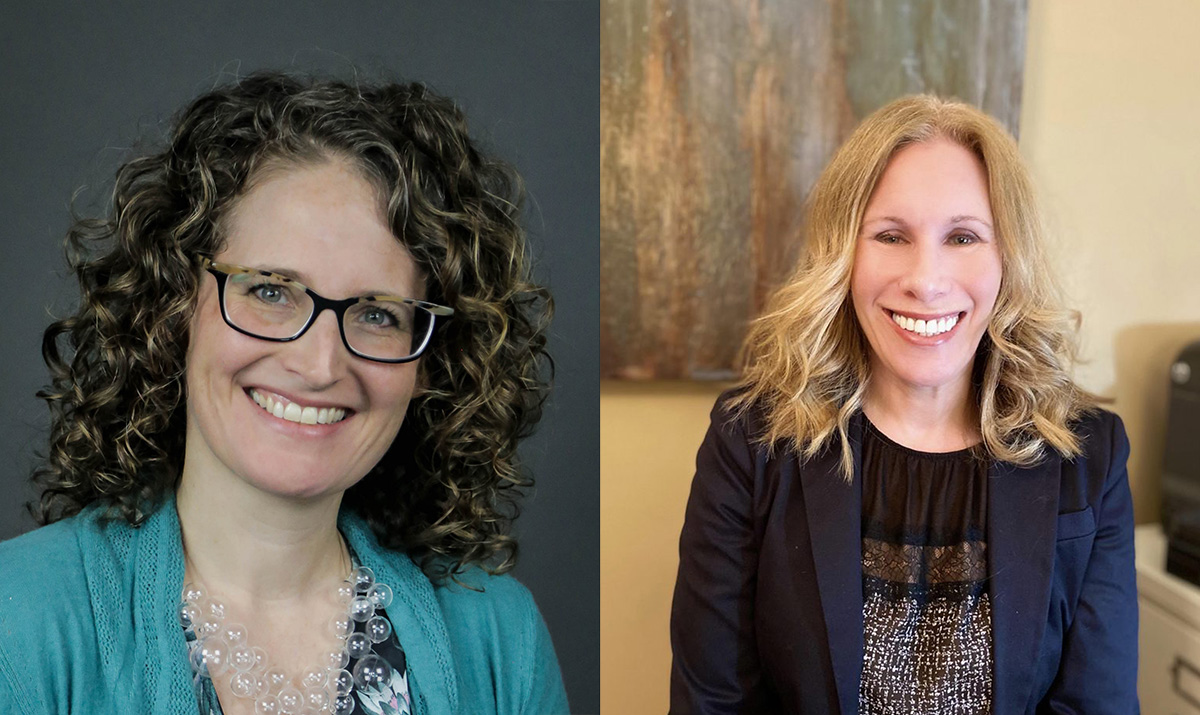Like all researchers, Amanda Howerton-Fox and Jodi Falk understand that citation of their work by others is one of academia’s gold standards — proof that their ideas are not only intellectually stimulating, but have recognized application to problems in the real world.
Citation by the nation’s incoming presidential administration, however, wasn’t on their radar. So the two doctoral graduates of Teachers College’s Deaf & Hard of Hearing Program were happily stunned when they received word that their study, “Deaf Children as ‘English Learners’: The Psycholinguistic Turn in Deaf Education,” published in 2019 in the journal Education Sciences, has become a cornerstone of President-Elect Joe Biden’s federal disability policy.
[Read The Biden Plan for Full Participation and Equality for People with Disabilities.]
“We had no idea,” says Howerton-Fox (Ph.D. ’13, M.A. ’02), Assistant Professor of Education at Iona College.
Certainly, Howerton-Fox and Falk (Ph.D. ’17, M.A. ’95), Executive Director of the St. Francis de Sales School for the Deaf in Brooklyn, knew their paper was a potential game-changer.

BLENDING THEORY AND PRACTICE Amanda Howerton-Fox (left) is Assistant Professor of Education at Iona College and Jodi Falk is Executive Director of the St. Francis de Sales School for the Deaf in Brooklyn. Their 2019 paper is prominently cited, verbatim, and linked in President-Elect Joe Biden's disabilities policy. (Left: Photo by Jo Cardin, for Iona College; Right: Courtesy of Jodi Falk)
A study of language development for young deaf children, “Deaf Children as ‘English Learners’” explores gaps in the development of language skills in the formative years, with a special focus on deaf children raised in non-English speaking and non-signing households. The authors note that deaf children have largely been ignored in “policy discussions” on English language learning and are “therefore…unaffected by the reforms and changes in the educational infrastructure.”
More specifically, Howerton-Fox and Falk advocate for pedagogies, strategies and technological breakthroughs to provide deaf children and their families early access to sign language and bilingual programs.
The project dovetails with a Biden campaign pledge to deliver “full participation and equality for people with disabilities.”
Quoting the paper nearly verbatim, the Biden platform notes that “language deprivation for children who are Deaf or Hard of Hearing in the early years of life can have a lasting impact on a child’s language and cognitive skills.” The platform pledges a federal policy that will “provide parents, health care providers, and early childhood professionals the resources needed to support these children.”
The language knowledge the students were lacking seemed so much deeper than translating between sign language and English. They were struggling with language – period.
—Amanda Howerton-Fox (Ph.D. ’13, M.A. ’02), Assistant Professor of Education, Iona College
Howerton-Fox and Falk received word of the study’s prominence in the Biden policy blueprint through a congratulatory email from the Executive Director of the Conference of Educational Administrators of Schools and Programs for the Deaf (CEASD), an advocacy group that lobbies for federal policy impacting deaf education. “But how they got it is a mystery,” says Falk.
“My best guess is that it is the most comprehensive, recent review of the linguistic, cognitive and social-emotional issues relating to early childhood deaf education,” says Howerton-Fox.
Howerton-Fox and Falk met by chance a few years ago at the annual meeting of the American Educational Research Association (AERA) in Texas. “We were sitting near each other and realized we had something in common,” Howerton-Fox recalls.
As researchers, the two complement one another well.
“She’s at the university level and I’m at a school administrator so we were able to bring the two lanes together,” says Falk.
Both say they are motivated by having taught deaf and hard-of-hearing students.
“The language knowledge the students were lacking seemed so much deeper than translating between sign language and English,” recalls Howerton-Fox. “They were struggling with language — period.”
Within our community for the oldest program of Deaf Education in the nation and the only Deaf Education program among Ivy League institutions, we are proud of our graduates and their accomplishments.
—Angel (Ye) Wang, Professor and Program Director, Deaf & Hard of Hearing
Falk was likewise moved by the realization that parents of many deaf children “couldn’t communicate with their own children. It really pulled at my heart strings and changed the direction of my career.”
At TC, faculty who worked with Howerton-Fox and Falk are delighted to see them recognized. “I am quite proud of what these former students have done,” says Robert Kretschmer, Professor Emeritus of Education & Psychology, former director of TC’s Deaf & Hard of Hearing program. Kretschmer advised both Howerton-Fox and Falk when they were TC students and also supervised Howerton-Fox’s dissertation. “Not only was their article cited in President-Elect Biden's Plan,” he adds, “but, interestingly, when I went through all of the highlighted references linked in the Plan, theirs was the only peer reviewed article referenced.”
“Within our community for the oldest program of Deaf Education in the nation and the only Deaf Education program among Ivy League institutions, we are proud of our graduates and their accomplishments,” says the program’s current director, Angel (Ye) Wang, Professor of Deaf & Hard of Hearing, who supervised Falk’s dissertation.
The research was definitely there, but we needed to get a seat at the table for deaf academics, deaf educational leaders and hearing allies. We were thrilled to find out that deaf education is already on Biden’s agenda.
-- Jodi Falk (Ph.D. ’17, M.A. ’95), Executive Director, St. Francis de Sales School for the Deaf in Brooklyn
Beyond enjoying a moment in the spotlight, both women are pleased at the prospect that their work could help reshape deaf education.
“The research was definitely there, but we needed to get a seat at the table for deaf academics, deaf educational leaders and hearing allies,” says Falk. “We were thrilled to find out that deaf education is already on Biden’s agenda.”

